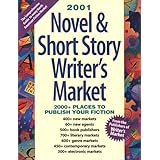
Average Reviews:

(More customer reviews)Where to begin?
While many professional writers avoid this guide because of its incomplete listings and sometimes (but not often) amateurish suggestions, I buy this book every year because it has the most comprehensive entries of any market guide. I use it almost exclusively to market my short stories, although, if you read on, you'll see how useful the book publisher section can be.
For the novice writer, the sections on manuscript mechanics and submission procedures will probably be the most helpful, but once you've read and learned them, you'll be able to skip them in subsequent editions.
Despite what another reviewer claims, you CAN sell your novel without an agent; I know because I sold my first this way, using this guide as a starting point. While many large publishers are reluctant to give an unagented writer a serious reading, this guide contains listings for many smaller presses, most of which are eager to receive high quality work from anyone, agented or not. These presses are a growing force in today's market because they publish quality fiction that might not have the commercial appeal many of the major houses want.
The articles and sidebars are often interesting, but not always helpful. You really want to get at the meat here: the individual entries that contain addresses, names, needs, page limits, submission procedures, and writers each has published previously. Pay attention! Don't send a literary story to a mag that publishes horror. If a publisher wants a query first, do it. If they state they only accept unsolicited manuscript in the fall, don't submit in the spring.
Don't make the mistake of relying only on this guide. Research the markets beyond what you find here: track down a small publisher's books at your bookstore, read (or better yet, subscribe) to the magazines you think most likely to accept your story, understand what editors expect. Attend author readings and workshops to better understand the business. You should be aware that many magazines and publishers don't submit listings; if you can't find a particular entry, you'll have to do the research on your own.
Yes, you need to buy a new edition of this book every year. Many listings change yearly due to employee turnover and finanical hardship. If you are serious about pursuing a career in writing, you can't afford to use old or faulty information. This book won't help improve your writing - only practice and constant reading will do that - but, if used properly, can be an excellent tool to teach you about the fiction market.
Click Here to see more reviews about: 2001 Novel & Short Story Writer's Market (Novel & Short Story Writer's Market, 2001)
If you write fiction, the 2001 Novel & Short Story Writer's Market is the first, crucial step to your publishing success. Inside you'll find completely updated market entries for book publishers, magazines, literary agents and contests, plus brand new information on e-publishers, including interviews with industry experts, editors of e-magazines and more! Whether you write literary short stories or whodunit mysteries, other-worldly science fiction or passionate romance, each listing provides you with all the information you need to reach those people who can get your work in print. Margaret Atwood, Kurt Vonnegut, John Jakes, Dave Eggers and the editors at McSweeney's, House of Leaves author Mark Danielewski, and the editors from Seventeen. Harper's and Blue Moon Review share their secrets in special Insider reports and interviews. Youill also receive exciting insights into the romance and mystery markets from Diana Gabaldon and Otto Penzler. All this, plus answers to your frequently asked e-book questions in a single volume make 2001 Novel & Short Story Writeris Market the most important book youill buy this year.

No comments:
Post a Comment